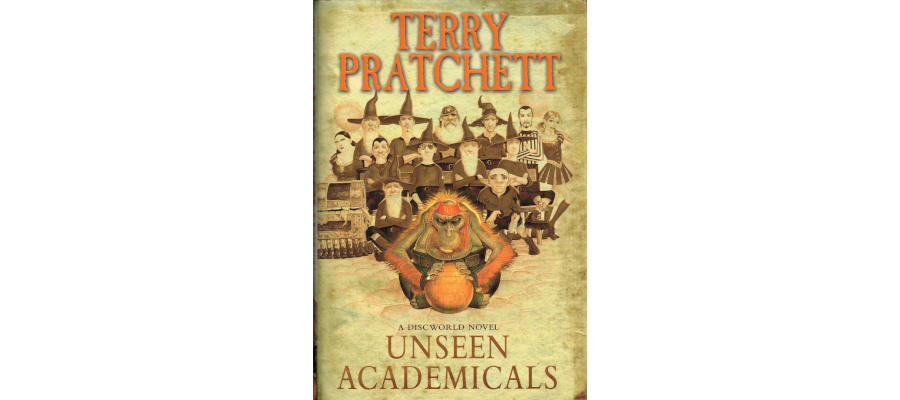When considering the Discworld series of books, it seems at times that it’d be almost boring for me to discuss them, because they’ve been so important to my personal history and interests that it’d be a bit like ‘oh, hey, this thing I like, but obviously I would, wouldn’t I, because I’m that basic that I kind of got my personality from a series of fantasy novels.’ Every single one of the books that I love, I can almost hold up and say ‘this book was basically written for me, as a person,’ given my interests. And if I could pick the one Discworld book to hold up as an example of me in a book, the things and ideas and experiences that all hold together for me, I think there are definitely books that I think of as cooler and better and having amazing moments and important lines in them. I could name Men at Arms with its maxim that a good man will kill you without a word. I could name Hogfather with its line you have to believe in the small things that don’t exist. I bet I could look stylish as hell if I could invoke Feet of Clay‘s maxim that all days are holy or none are or Monstrous Regiment and you are my little lambs, so many cool lines that would flatter my ego to talk about how this book is a good insight into me.
But there’s a Discworld book that kinda, without meaning, hits me with both barrels, reveals a second shotgun, fires another pair of barrels, and then reloads both of them again.
Hi.
This is me, pretty much.
SPOILERS after the fold.
Unseen Academicals is a 2009 main-series Discworld book centered around some new, original characters, and includes the Wizards of the Unseen University as your structure around it. In the Discworld you can kinda lay books into (overlapping) plot tracks that show progression of kind of greater meta plots. One example is that the city of Ankh Morpork, a single location, goes through stages of development under the reign of the Patrician Lord Vetinari, the city-state’s Tyrant. At first the city is a wreck, then there’s a story about the institution of a useful multiracial, cosmopolitan Watch, a legal system separate from the political system, newspapers, the postal service, the mint, and here, the conversion of street gangs playing football into an actual established league with standard rules and culture. It’s one of the charming things about the series as it grew over time, where Pratchett kept wanting to address the question of ‘how does this world exist the way it does,’ in those ways of worldbuilding, where things don’t just spring into existence because we have them here.
It’s a story about football.
Except it’s not really about football, it’s about everything else but football.
It’s about how people react and what they use football to do and how they live and react and interact in the context of football. It’s about the people who play and why they play and why they don’t play and what it is to be part of the moments of the play and the way that chaos can be shaped and shared and connected to one another and it’s about the crab bucket and it’s definitely, definitely about football.
Soccer, I guess.
But wait, that’s not all, it’s also following the story of Mr Nutt, who is an orc. He’s the only orc we’ve seen in the Discworld so far, and only the second mention of orcs at all. The fact he’s an orc is central to the mystery of the story, but that mystery is secondary to the point of the story; being an orc is not that remarkable, but being seen as an orc, being treated as an orc is extremely remarkable. The story has all these questions hanging on it, built around the idea of being an orc, with the stereotypes of what people believe, where those stereotypes come from, and what that lived experience is if you don’t have a society telling you what you are.
Indeed, the question of living in a society is a big part of Nutt’s story: There’s how one society treated him, and how the society of Ankh Morpork reacted to him agnostically, then how they react to him as an orc, and how people, expecting those reactions prepared for that reaction.
And mixed in with that it’s this story about a guy, isolated from people with a lot of catechism in his head struggles to try and live a life as a person with only the rules in his head to try and tell him how to be anything. Especially since he’s obviously very smart and capable of intense violence that he always keeps extremely under control, because he’s supposed to keep it under control. Being an orc, and being therefore, associated with intense, military campaigns of, for lack of a better term, zerg-rushing people in wars, is also used as a sort of example of the overinvestment of military research used badly. Orcs in this setting are basically impossible to kill (there are methods, but you don’t get a lot of opportunities to get good at them), strong enough to kill any human one on one, get back up from being heavily injured, intensely prosocial and inclined towards teamwork.
And they acted violently because they were forced to.
They were cutting edge super soldiers, a generation of Captain Americas, and then they were deployed in blind droves, lions led by donkeys but like, also materially like lions proper. Crafted by Igors, led by humans and left over as a result of a dreadful experiment, almost exterminated and left sad, lonely, and isolated. The idea, as with so many things in Discworld sciences, is that people, almost universally, are people, and we are shaped by our experiences, that our surrounding circumstances are a big tube you get poured down and what spoots out the other end is you. Orcs, sure, you got the history, a real history, of orcs as a war machine in full Tolkeinesque fashion, but that was a thing that was done to them, as well as a thing they did.
Know what else is one of the major plot threads in this? University life. The life and management of the educational facility, the ways that these groups were in communication with one another, and just what it meant to have a lot of meetings. So many meetings. It’s a weird thing I grew up into, working at a university and seeing the ongoing question of researchers and tutors as we interact with students and lectures and the comedic angle of what a university looks like when the university and teacher treat the whole arrangement the same way.
It’s a funny B-plot but it’s also got all these elements to it that feel weirdly congruent. The way that you have to plan everything, that sort of strange, slow, grinding, the way that a narrative built out of the process of making a game, of formalising a street game, is presented as being like parking a big slow bus. And then there are so many jokes, so many jokes, that are about the way people in university spaces tend to be. Then that gets amplified by the way that the book serves as a sort of multi-layer reference document.
Because when I started reading Discworld books, I started from the first book, The Colour Of Magic, and I thought that Discworld was the story of Rincewind. I thought this because I had played the demo of the videogame and I got it in my head that okay, this guy is the central character of the whole story. That is a false idea, but that idea can be mistakenly constructed if you read the books in a rush – The Colour of Magic chains into The Light Fantastic then we have a diversion to Equal Rites and Mort and then, we get Sourcery and… suddenly a dead nothing and no appearance of Rincewind for six years and eleven books with the book Interesting Times. But that meant that I did see those stories as being ‘the proper’ core of the stories (which wasn’t even vaguely true).
Those four Rincewind books (Eric wasn’t considered part of the core at this point) were in my mind ‘default’ Discworld. They were about what Discworld was meant to be about. And that meant I reread those books and I noticed a lot there. And Unseen Academicals is full of little nods and winks to those earlier books – like Rincewind pulling off a sock to interrupt a wizard duel with a brick, or the danger of the Luggace, or how in Sourcery there’s a single, minor mention of orcs and that’s the only other time they show up in Discworld.
There’s more, of course. There’s story about the Crab Bucket. About star power, about skills and talents and pursuing your dreams and about the way we unconsciously hold people back while we try to draw them in, about how we learn to be people and how we don’t respect people when we treat them like they need us and they didn’t ask us to, and god damn there’s so much in this book that feels like it was written so I could wave the words of someone much better at writing than me over my head so you could get it by reading it.
This is a book about games, about rules, and about culture.
In Half Real Jesper Juul describes games as being made of real rules and fictional worlds. In a game’s context, the football doesn’t know what the football is, but football knows what football is, and it only knows those things as much as there is football happening, as long as the fiction of the goals mattering is being recognised by the real rules.
And of course, there’s the poem, from near the ending, which is as best I understand it, an almost rapturous, shamanic expression of what it is to be part of the game, and why the game matters.



